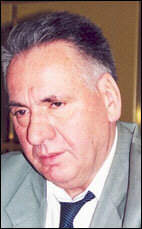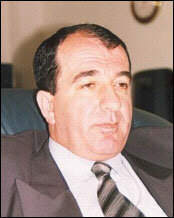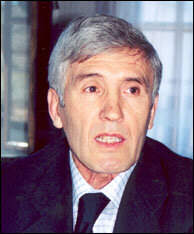 ORDER & LEGISLATION IN THE BANKING AND INSURANCE MARKET ORDER & LEGISLATION IN THE BANKING AND INSURANCE MARKET |
The Banking system was totally destroyed during the 1990's. After the occupation there was only one single bank that functioned normally in Kosova, Banka Ekonomike SH.A. (Economic Bank, share-holding company). UNMIK officials saw that the best alternative was to eliminate all shadows of Kosovo“s previous banking system in order to reinstate Kosovars' trust in Banking and other financial institutions.
The development of commercial banks in Kosovo began in September 1999.
To insure order, control and proper supervision within the sector the Banking and Payment Authority was established. In its beginnings the institution performed the basic duties of a central bank as well as that of a commercial bank. Since the spring of 2001, the Banking and Payment Authority of Kosovo, started to delegate some of it's duties to commercial banks and in the future it will exclusively have the function of a central bank. The institution is still paying public sector employees. There are now 7 commercial banks functioning in Kosovo and it is expected that very soon the licensing of two new banks will be granted, one of them has already received its preliminary license.

18 shareholders established the Economic Bank in the year 1999. Around 70% of its basic capital belonged to Kosovar social enterprises.
The President of Economic Bank, Mr. Hajrullah Zaiti explains how "with Ante Markovic's law enterprises were transformed into share holding associations. Therefore Serbia had no way to implement its administration powers within these companies. These companies used this chance, and they separated 2.5 million DEM and then established the Ekonomike Banka in Gjakova. (.) Our history is long; we started working with 18 shareholders, when we were established in 1991. Before the war we worked with 6.500 enterprises." Up to January 2002 Banka Ekonomike was only authorized to offer currency exchange services. After being issued a license from BPK (Banking and Payment Authority of Kosovo), Banka Ekonomike now functions normally. Banka Ekonomike is ranked as a second level bank, with deposits of about 2 million Euros in BPK.
During its first phase of development, the banking system developed at a staggering pace. At the beginning of the year 2000, Micro Enterprise Bank (MEB) was the first bank to be issued a license for offering banking services. Shareholders of the bank are made up of mainly western banks, especially German banks. The trust that Kosovars had in German business ethics gave the bank immediate success. MEB was instrumental in gradually regaining the trust people had lost in banks during the previous decade. MEB had, in its first year, deposits worth 50 million Euros. Two months before the conversion from DM to the Euro was to take place its deposits had increased to 150 million Euros. Today the MEB provides credit loans to medium and small size enterprises. The General Manager Mr. Wasmus is proud to highlight MEB progress. "We were the only bank in the market during the whole of 2000. From the very beginning we experienced a high demand for all sorts of banking services. The bank expanded rapidly and MEB is still by far the largest bank in Kosovo, holding an estimated 70% of commercial bank assets". There has been however, a great deal of criticism steaming from the fact that the remaining banks in the sector that were not licensed until November 2001, had a total amount of combined deposits of just 50 million Euros during the same period.
After MEB the ranking of the banks by terms of highest level of deposits in the year 2002 was as follows: New Bank of Kosovo, Bank for Private Business, American Bank of Kosovo, Economic Bank of Kosovo and Credit Bank Prishtina.
Banka Popullore e Kosovės (National Bank of Kosova) functioned as an independent unit within the system of National Banks, which was constituted by the 9 main national banks of the Former Republics and Autonomous Provinces of Yugoslavia. Its potential was amongst the largest in ex-Yugoslavia and was a main pillar for the development of the economy of Kosovo.
During the 1990“s four consolidation exercises were undertaken and Banka e Kosovės was registered as a joint stock and share holding company. It had USD 742 million in deposits and debts in value of USD 660 million. All its wealth went to satisfy the advance deposits provided by "Jubanka", but it refused to pay off the debts of Banka e Kosovės. The debts of this bank will continue up to the year 2004 and are in excess of 943 million USD, without taking into consideration punitive interest rates. Amongst the alleged $742 million deposits that disintegrated, $250 million were deposits of Kosova citizens. Since this catastrophe happened, Kosova Albanians lost all trust in the banking system until UNMIK issued the first license for a commercial bank. For over 10 years, Kosovars refused any cooperation with commercial and Serb state run banks. They preferred to keep their savings under their pillows.
After the war, Banka e Kosovės wanted to resume activities, UNMIK however did not allow this. The matter is closed and will be discussed when its property and assets are to be divided amongst its different creditors scattered through out the ex-republics of Yugoslavia.
The German DM was first used as a replacement currency after the removal of the Yugoslav Dinar. The conversion to the Euro was perhaps one of the biggest boosts that the Kosovar economy received after resolution 1244. Micro Enterprise Bank has been instrumental in the introduction of the Euro " As the largest bank in Kosovo we had a particular responsibility in ensuring that there were enough Euro's in Kosovo in the first months of this year. Kosovo is a typical cash economy, which put additional strain on the changeover process. During the first few months we gained a lot of new clients that opened an account for the purpose of exchanging money. Many of these new clients have started to bank actively with us", says its GM Mr. Cohen Wasmus. Until January 2001 there were 1 billion-DM deposited in banks, before being automatically converted to the Euros. Another 500 million to 1 billion DM were converted in banks with provision or in illegal ways. Since for converting amounts of above 30.000 DM, commercial banks were obliged to inform BPK, MEB profited extensively on this conversion. Its deposits rose to almost 400 million Euros in a matter of months. MEB continues to dominate the banking sector of Kosovo.
Commercial banks in Kosovo provide second level banking services. The loans that they provide are mainly for business but interest rates are very high. The annual interest rate is 12-18%. New projects regarding loan structure were initiated by MEB, which has started giving loans for the reconstruction of houses. The term is to pay back the loan in 4 years, with annual interest rates of 12%. According to the statistics given by MEB itself, this bank during its two-year period of work has given loans that have a value of 25 million Euros. The other banks have given roughly the same amount in loans, although their deposits are much lower. Commercial banks provide other services such as ATM machines, deposit and current accounts and international transfers.

ABK General Manager Mr. Oliver Whittle.
| American Bank of Kosovo is one of the most recently established institutions in the sector. ABK "was set up with the intention of providing loans to small and medium size enterprises; to allow them to develop in Kosovo, particularly with the objective of generating jobs and at the same time mobilizing the deposits; to encourage people to have trust in the banking system and to encourage the use of banks in general", says its General Manager Mr. Oliver Whittle.
So far the bank has promised that its financing would provide 20,000 job opportunities in the medium to long term.
After two years of consistent and reliable banking practices, about 50% of all the transactions are now being executed through the use of banks. Authorities at BPK have worked intensely in improving regulations within the banking system and eliminating the cash in hand system. Most money transfers today that are above an amount of 100 Euros take place through commercial banks. Around two to three thousand employees receive their salaries through commercial bank accounts.

The insurance market in Kosovo has also been completely restructured and rebuilt from scratch. As well, order and legislation have been achieved after being placed under the control and supervision of the Banking and Payment Authority of Kosovo. Immediately after the war UNMIK assumed the responsibility of reestablishing control of the sector, just two companies were granted licenses for issuing insurance; the American AIG which left the market after only one year in operation, and the Albanian State company for insurance INSIG. Both of these companies shared the Kosovar market for more than one year while UNMIK decided to grant licenses to additional companies, up to a number of six companies, in order to encourage competition. These were INSIG, Siguria, Dardania, Kosova, Dukagjini and Drini.
Regulation from the BPK came about with the first signs of disloyal competition amongst different insurance companies. Unfair competition became evident in the year 2001. In order to amend the situation, BPK stipulated a number of regulations, which combined with the goodwill of all the companies in the sector, brought about proper and transparent procedures. In addition, the Banking and Payment Authority of Kosova required all companies to reapply for their licenses in order to meet the new regulations that had been implemented. The new conditions to be fulfilled were more demanding, requiring a minimum deposit of 2.5 million Euros instead of the 1.25 million that the original legislation required. Nevertheless, all companies were able to regain their license rights, and in addition BPK granted two additional licenses to the Dukagjini and Drini insurance companies.
Today there are six insurance companies competing with one another strictly in terms of quality of service. The six companies have also signed a cooperation protocol in which they all agree to harmonize many of their vital functions. This harmonization involves the fixed prices of premiums, fixed levels of discounts offered to customers and even a fixed number of representatives that each company has present within the territory. In addition the issuing of insurance policies is done through a body that ensures the legality of each and every policy. Companies cannot then issue the insurance policies on their behalf but rather on behalf of the Associated Insurance Companies of Kosovo. The Association of Insurance Companies of Kosovo issues insurance policies and the money gathered is then divided amongst all Kosovar insurance companies. The oldest companies take 20% each and the new companies such as Dukagjini and Drini only receive 10%. This decision has satisfied all the companies and the primitive state of the sector leaves the door open for more players. The privatization process will ensure that further competition is injected in the sector. The possibilities for investment in this respect are many but legislation has to be implemented so that other types of insurance can be allowed.

Mr. Petraq Simo the General Manager of INSIG Kosovo is confident of the company's future dominant role in the sector "INSIG, is ready and will be able to offer other kinds of insurances as soon as the market is opened for them. We think that the market is already grown up enough and it should be opened up completely. We are expecting to have the license for other kinds of insurances in approximately 3 months time."
The Kosovar insurance market is considered to be very profitable, taking into consideration that it covers a territory of 10000 km2 and with a population of two million inhabitants. The Directorate of Kosovo“s Roads estimates that there are more than 400,000 cars in circulation. In the municipality of Prishtina alone, there is an estimated 125, 000 cars.
These conditions have arisen from the fact that Insurers are only allowed to provide third party car insurance which intensifies the level of competition amongst the few players present. Legislation to allow the insurance companies offer life insurance coverage, or HMO services is still to be drawn up and implemented. Kosovar companies are preparing themselves to enter into different spheres of the insurance sector while it remains a completely virgin market in the field of medical insurance.

The President of the Assembly of Kosovo,
Mr. Nexhat Daci
With the approval of a Constitutional Declaration and the creation of the essential legislative bodies, Kosovo has already been able to see the successful completion of two parliamentary elections. The results of the elections have been quite tied and a coalition of the three main parties has developed. The President of the Assembly of Kosovo, Mr. Nexhat Daci, says that this coalition has created a "Broad Base Government, a coalition of the three main Kosovar parties: the LDK, the PDK and the AAK. I am absolutely convinced and optimistic about the future of that government and the coalition". Some competencies, which until now had been reserved powers of the SRSG, are to be passed onto Kosovar leaders in the following months.
The newly appointed Prime Minister of Kosovo Mr. Rexhepi explains that with the assistance of UNMIK "we are working to complete Cabinet of the Prime Minister, and the cabinets of the other ten ministers". Kosovo is in no doubt making progress and it has now moved from a reconstruction phase to a development phase. There seems however a lack of a carefully analyzed and comprehensive strategy that attempts to develop sustainable economic growth, while giving the economy a solid base and direction. This lack of direction can also be partly attributed to the many unresolved political questions associated with economic policies and freedoms, which inevitably translates into social discontent and obvious increased investor uncertainty. |

